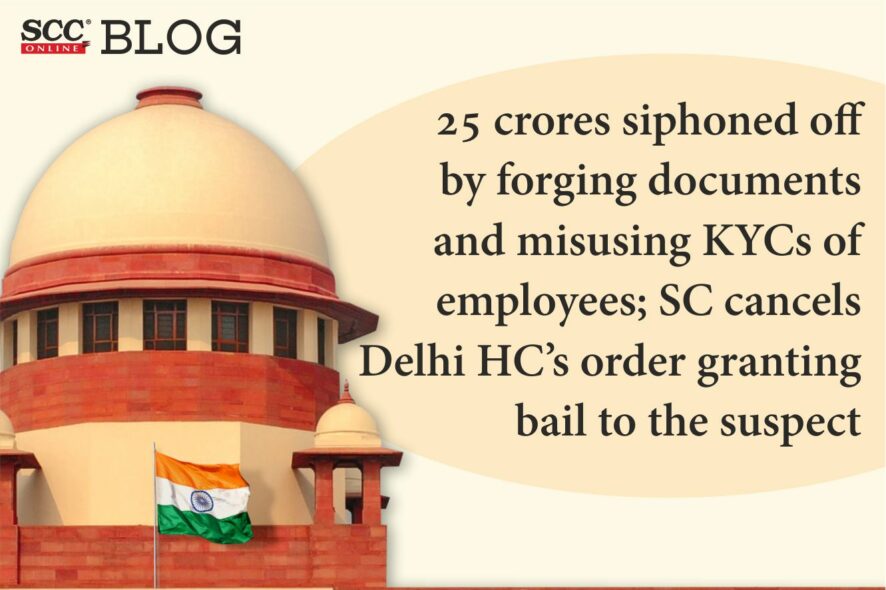Supreme Court: While addressing a case related to systematic fraud by creating the false/forged documents and/or misusing the PAN Cards, Aadhar Cards and KYCs of the employees and showing them as Directors of the fake and shell companies and siphoning of Rs. 25 crores, the Division Bench of M.R. Shah* and Sanjiv Khanna, JJ., held that mere non-misuse of liberty cannot be a ground to confirm the bail order otherwise not sustainable in law.
Background
The genesis of the case relates back to the FIR filed by the appellant, a non-banking financial company in PS Economic Offences Wing against the company, Sri Aranath Logistics Limited (formerly known as M/s LMJ Logistics Limited)-Respondent 2, Jayant Kumar Jain–Managing Director and others for the offences under Sections 409, 420, 467, 468, 471 and 120B Penal Code, 1860 alleging that the amount of 25 crores was siphoned off and transferred to other shell companies and the said amount was used by the Respondent 2 for other companies.
The appellant had preferred the instant appeal against the impugned judgment and order of the Delhi High Court by which the High Court had granted bail to the respondent 2. Noticeably, a detailed status report was filed pointing out how a sum of Rs.25 crores to be used by M/s LMJ Logistic Ltd. was transferred to shell and other companies such as M/s LMJ Logistic Limited and how a systematic fraud was committed.
The grievance of the appellant was that despite the said status report, by the impugned judgment and order, the High Court had directed to release Respondent 2 on bail merely on the ground that the case arose out of a commercial transaction and was based on documents already seized.
Observations and Analysis
on bail the High Court has not at all adverted to and/or considered the nature of accusation and the material found/collected during the course of investigation and the serious allegations of siphoning off the huge amount through various shell companies. Even the High Court has not at all taken note of the reasoning given by the learned Sessions Court while rejecting the bail application of Respondent No.2. and has released Respondent No.2 on bail by simply observing that case arises out of a commercial transaction and the dispute is of a civil nature.
Applying the law laid down by the Supreme Court in Prasanta Kumar Sarkar v. Ashis Chatterjee, (2010) 14 SCC 496, Anil Kumar v. State (NCT of Delhi), (2018) 12 SCC 129 and Prahlad Singh Bhati v. (State) NCT of Delhi, (2001) 4 SCC 280, the Bench held that the High Court had not at all considered the modus operandi adopted by the accused in commission of serious offence of siphoning and/or transferring the huge sum to another company through shell companies. The High Court had also not taken into consideration the status report filed by the I.O. in which it had been pointed out in detail how systematically the accused had committed the offence and misappropriated/siphoned off the huge sum through shell companies.
On the argument of the respondent that as there were no allegations of misusing liberty, the bail may not be cancelled, the Bench noted that the order passed by the High Court releasing the accused on bail had been passed mechanically and without adverting to the relevant facts and without considering the nature of accusation and allegations and the nature of the gravity of the accusation. Therefore, the Bench opined,
“There is no absolute proposition of law that once the bail is granted by the High Court, though the High Court could not have granted the bail, in absence of any allegation of misuse of liberty and/or breach of any of the conditions of the bail, the bail cannot be set aside when grant of bail is itself subject matter of challenge in appeal/revision.”
Difference between Rejection and Cancellation of Bail
Opining that the rejection of bail in a non-bailable case at an initial stage and cancellation of bail so granted has to be dealt with and considered on different basis, the Bench stated that very cogent and overwhelming circumstances are necessary for an order directing the cancellation of the bail already granted. Reliance, in this regard was placed by the Court on Mahipal v. Rajesh Kumar, (2020) 2 SCC 118, wherein after drawing the distinction between the power of an appellate court in assessing the correctness of an order granting bail and an application for the cancellation of the bail, the Court had observed,
“The correctness of an order granting bail is tested on the anvil of whether there was an improper or arbitrary exercise of the discretion in the grant of bail…on the other hand, an application for cancellation of bail is generally examined on the anvil of the existence of supervening circumstances or violations of the conditions of bail by a person to whom bail has been granted.”
Hence, the Bench held that where a Court while considering an application for bail fails to consider the relevant factors, an Appellate Court may justifiably set aside the order granting bail. The Appellate Court is thus required to consider whether the order granting bail suffers from a non-application of mind or a prima facie view from the evidence available on record.
Conclusion
In the light of above, the Bench concluded that the High Court releasing Respondent 2 on bail was unsustainable as the High Court had not exercised the jurisdiction judiciously and had not considered the relevant factors while granting bail. Consequently, the impugned order was quashed and the accused was directed to surrender before the Court/Jail Authority concerned.
[Centrum Financial Services Ltd. v. State (NCT of Delhi), 2022 SCC OnLine SC 100, decided on 28-01-2022]
*Judgment by: Justice M.R. Shah
Appearance by:
For the Respondent 2: Mukul Rohatgi, Senior Advocate








Really informative article